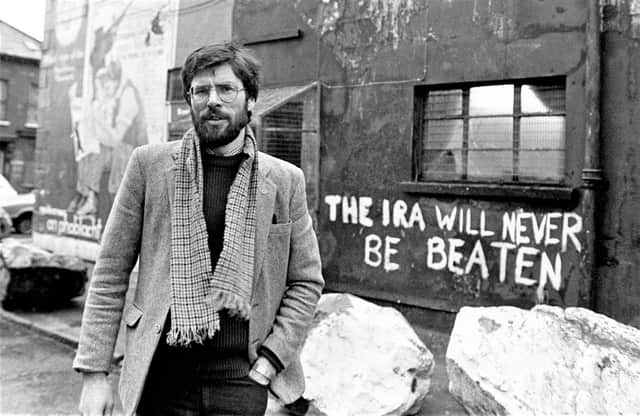Declassified files: British government believed Gerry Adams was on IRA Army Council


According to a confidential record of a conversation in October 1994 between Irish Ambassador to Britain, Joseph Small, and Paul Lever, a senior official in the Foreign Office, the UK government believed that the Sinn Fein president sat on the IRA Army Council.
Mr Small referred to the fact that the British civil servant had said that a Mr Murphy “was the member of the seven-man IRA army council who showed most reluctance in relation to the statement of August 31 although he did not dissent in the end”.
Advertisement
Hide AdAdvertisement
Hide AdReferencing the decision of the IRA to announce a ceasefire, the British official appears to be referring to Thomas “Slab” Murphy, who is alleged to have been one of the most powerful individuals in the IRA.
The Irish official says that “another one or two may have had reservations although they, too, went along with the decision”.
“According to Lever, Adams sits on this council.”
Gerry Adams has always denied that he was a member of the IRA.
Mr Lever had told the Irish diplomat that “there was no evidence over the last month that dissidents were peeling off from the Provisionals and forming alliances with the INLA or Republican Sinn Fein”.
Advertisement
Hide AdAdvertisement
Hide AdThe British, according to the document, were “not too worried” about the INLA whom they saw as lacking “operational capacity” and possessing “no clear political agenda”.
The Irish ambassador notes of that of Gerry Adams, “it was quite clear that Lever shares the general hatred of the man so evident in British governing circles”.
On the recent ceasefire, Mr Small said that the British would have to wait for a “positive nod” from the then Ulster Unionist Party leader, James Molyneaux, before the Prime Minister, John Major, can publicly indicate that the ceasefire is permanent.
“Lever gave the impression that this could happen anytime after mid-October. He nodded in agreement when I added the words, ‘after the Tory Party conference’”.
——— ———
A message from the Editor:
Advertisement
Hide AdAdvertisement
Hide AdThank you for reading this story on our website. While I have your attention, I also have an important request to make of you.
With the coronavirus lockdowns having had a major impact on many of our advertisers — and consequently the revenue we receive — we are more reliant than ever on you taking out a digital subscription.
Subscribe to newsletter.co.uk and enjoy unlimited access to the best Northern Ireland and UK news and information online and on our app. With a digital subscription, you can read more than 5 articles, see fewer ads, enjoy faster load times, and get access to exclusive newsletters and content.
Visit
now to sign up.
Our journalism costs money and we rely on advertising, print and digital revenues to help to support them. By supporting us, we are able to support you in providing trusted, fact-checked content for this website.
Ben Lowry, Editor